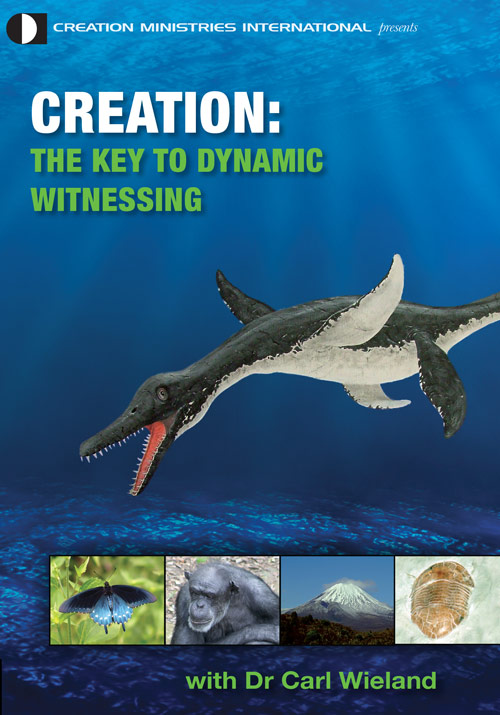Feedback archive → Feedback 2013
How helpful is creation evangelism?
How well does creation evangelism work with people who are unwilling to even consider biblical creation? Can we evangelize such people without mentioning biblical creation? CMI’s Robert Zins shows how creation evangelism, while not the only tool we should have in our ‘apologetics arsenal’, is an integral part of that arsenal.
Chavoux L. from Namibia writes in response to article: Backpackers, Dinosaurs and the Great Commission:

Hi Don
Thanks for the great testimony. My question is rather how well creation evidences works when you witness to people that have actually been trained (brainwashed?) in the biological sciences, especially when they are already antagonistic towards the gospel message? My experience have also been that people who think of themselves as “intellectuals” are much less willing to consider the evidence for (“young earth”) creation. I think that in these cases it might still be worthwhile to start with the basic gospel message (e.g. that all people are sinful is still true, whether Adam first sinned 6000 years ago or 10 million years ago). I have just not seen any of my professors or most of my fellow students being open to the possibility of a “young” earth, even though they might be willing to consider the existence of God (I studied zoology & ecology). I only even considered the possibility of God creating the world in 6 24-hour days, after I became a believer. The problem with a testimony like this one, even though I appreciate it, is that “educated” scientists will often dismiss it as being persuasive only because these backpackers were not trained scientists.
CMI’s Robert Zins responds:
Dear Chavoux,
Your interesting question was put to the CMI staff for comment. Several responded and below are comments by Gary Bates (GB), Shaun Doyle (SD), as well as my own, all of which I hope you find to be of some help.
You raise a number of significant issues about bringing the Gospel to people who have been trained in evolutionary science (and by implication, evolutionary philosophy). Given your experience that such people do not respond well to creation evidences, you ask, would simply sharing the Gospel (thus appealing directly to the conscience) be a more suitable approach?
Psalm 19:1–3 and Romans 1:18–20 attest that God has provided a testimony of Himself by way of His creation. This testimony is so powerful that man is without excuse (Romans 1:20) yet the rebellious man persists in attempting to suppress the truth in unrighteousness (Romans 1:18). It is certainly valid to appeal to a person’s conscience, to challenge the suppression of the truth. Jesus challenged the conscience of the Samaritan woman at the well (John 4), as did the apostle Peter when he addressed the crowds at Pentecost (Acts 2). In both cases the audience had some grounding in the Old Testament Scripture, some knowledge of the true God, His righteousness, and the promise of the Messiah.
However when the apostle Paul spoke to Greeks in Athens (Acts 17) he engaged people with little or no knowledge of the Old Testament. When he preached to them about the resurrection of Jesus Christ, they responded “What does this babbler want to say” (Acts 17:18). Then, considering his audience, Paul revised his approach and took them back to Genesis (Acts 17:22–26) provided them with the necessary foundation, then preached the Gospel (Acts 17:27–31), and some responded.
The separate encounters described in John 4, Acts 2 and Acts 17, help us to understand that people may be at various stages of unbelief.
GB commented: “I don’t think there is a formula that is for every person. If someone does not believe in God because his science has ruled the first book out, then telling him he is a sinner is likely to have less effect. I don’t think it is an either or. I think the evidence for Creation should be part of the Gospel message. Preach the Gospel and deal with the likely objections that will come up, which no doubt at some time will be creation based, particularly if the person is a scientist. A believer should be equipped in a number of areas to defend his faith, not only Creation.”
Personally, I grew up attending church as a youth, was exposed to some Christian message, but lost interest even before leaving high school. It was several years later that I began seeking for answers to life’s big questions. Then I heard a message on “What defiles a man?” (Mark 7:20–23) I fell under personal conviction of sin. And subsequently when I heard the gospel, by God’s grace I believed. In my case, I had never believed in evolution, so it was not an issue.
SD commented sharing from his personal testimony: “I thought the Bible was false because of the ‘absurdity’ of Genesis 1–11. The rest of the story was thus irrelevant to me. A guilt trip makes little sense to those who think the Bible can’t get basic history right. It was only when I was convinced the first 11 chapters could actually be true that I thought the rest had anything useful to say. I might be somewhat unusual in that I became a biblical creationist before I became a Christian, but that was the big issue for me—evolution proved the Bible was false. Once I understood the truth of the Bible and Christ, and what that meant for me personally, it didn’t take me very long to bow the knee. It was the only logical thing to do. If it was not for an emphasis on biblical creation on the part of some people around me, I simply would not be a Christian today.”
Trying to reach someone with the gospel, who has been schooled in evolutionary science (and by implication evolutionary philosophy), might be comparable to Paul seeking to reach Greeks in Athens.
When a non-Christian rejects clear evidence which corroborates the Genesis account, he will attempt to reinterpret that evidence using a different set of ‘worldview glasses’. It is not that the non-Christian merely has an intellectual problem with good creation evidence, but there is also a spiritual issue. As was said earlier, from Romans 1:18 we know that the non-Christian has knowledge of God through General Revelation, yet persists to “suppress the truth in unrighteousness” and is “without excuse”. Therefore a biblical apologetical method must be applied which takes into consideration that the Creation-Evolution debate is a component of a wider conflict between religious worldviews.
In such cases the Christian apologist needs to challenge the inadequate foundation of the non-Christian’s worldview exposing its inconsistencies and arbitrariness. This approach requires the sort of humility mentioned in 1 Peter 3:15. The Christian apologist must first engage the non-Christian and do an internal critique of the non-Christian’s worldview. Then the Christian apologist must demonstrate that the stated assumptions of the non-Christian’s worldview, when consistently applied, cannot support a rational or coherent understanding of reality. But how can this be so? It is so, because the non-Christian, whether he realizes it or not, borrows concepts which are only consistent with a biblical worldview. Hence the Christian apologist must press the non-Christian to be consistent within the terms of his own stated assumptions, for example, Materialism. A consistent Materialist might have some knowledge about the laws of science, mathematics, logic, and even ethics, however the Materialist cannot justify the existence of these things. Furthermore, the Christian apologist should be asserting that those basic elements required for a rational and coherent understanding of reality are only found with the presuppositions of a consistent biblical worldview.
This is consistent with Paul’s instruction to “cast down arguments and every high thing that exalts itself against the knowledge of God” (2 Cor. 10:4-5). After the Christian apologist challenges the non-believer, he might persist with his stated claims and deny the unsoundness of his own position—but now he has something to think about. It is the Lord by His Spirit Who persuades and changes the heart of the non-believer.
Chavoux, in closing, I would like to offer a caution in response to your suggestion, “ … to start with the basic gospel message (e.g. that all people are sinful is still true, whether Adam first sinned 6000 years ago or 10 million years ago).” [Italics added.]
Certainly, the Christian apologist might find it appropriate to start with the basic gospel message, and in doing so, might not immediately address the topic of Earth chronology. But the Christian apologist ought not to take the position that Earth chronology doesn’t matter, and certainly not suggest so in one’s interaction with some with whom you are sharing the Gospel. For in doing so, you would undermine the very Gospel which you proclaim. Please permit me to explain.
Philosophical naturalism was, historically, at the base of (and is the basis for) promoting old Earth chronology. Its assumptions are: 1) that nature is all that there is, and 2) the processes observed occurring naturally in the present, are the only processes which will be permitted to explain what happened in the past. These are the assumptions upon which both uniformitarian geology and evolutionary biology are based.
So, if during an apologetic discourse, you concede to old Earth chronology, then by implication you concede to the assumption upon which old Earth chronology is based (philosophical naturalism, and its implied rejection of the Genesis Flood cf. 2 Peter 3:3–5). If you permit naturalism to overrule the Genesis account of creation, then what will be your response to your sceptical scientist friend when he proceeds to consistently apply naturalism to overrule the Gospels’ account of Jesus’ resurrection? Plainly stated, it is not natural for a man who dies by crucifixion to rise from the grave. Of course Jesus’ resurrection was a supernatural event. Yet if the sceptic’s naturalism is given ‘a pass’ when it comes to the Genesis account of Creation and the Flood, then why should he accept the supernatural resurrection presented in the Gospel? And none of this has yet mentioned the huge inconsistency of placing death, the ‘last enemy’, and bloodshed before the Fall, which not only logically undermines the very Gospel you are seeking to present, it strikes at the very nature of God Himself.
Many is the person who has been attracted by a Gospel presentation, but then, when they start to see the inconsistencies in a naturalistic framework of history, and are told by Christians that it ‘doesn’t matter’, they turn away again. Ultimately, truth matters, and while care and sensitivity are important, to demonstrate to the hearer that one is making excuses for what the Bible plainly teaches is on average not likely to be helpful, perhaps far from it.
Sincerely, Robert Zins
CEO, CMI-South Africa







Readers’ comments
Comments are automatically closed 14 days after publication.